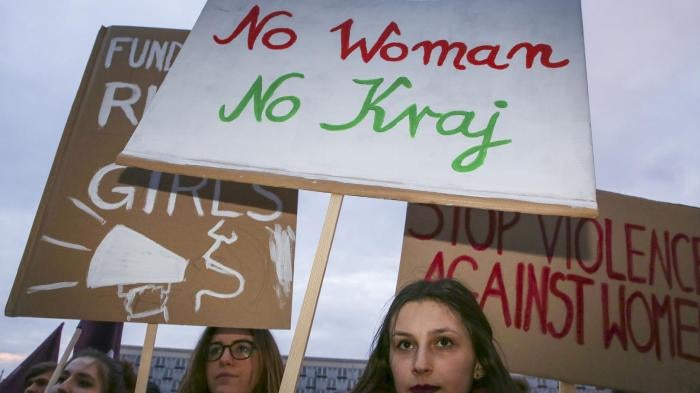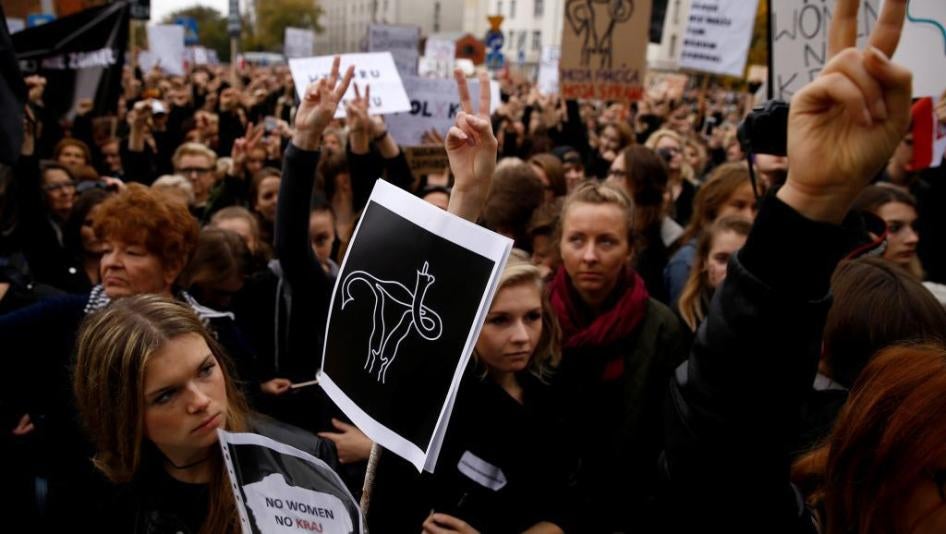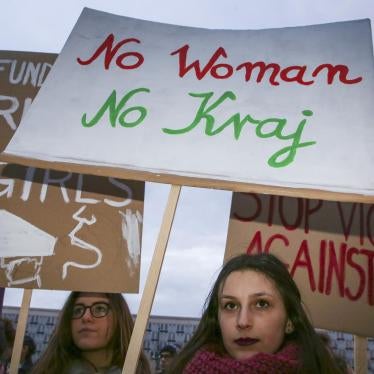Since that day, October 3, 2016, that one simple photograph which first appeared on Facebook, has been splashed over Polish newspapers, social media, and debated far and wide. Some of the women in it have been ostracized by colleagues, seen their careers suffer, and even become ill because of the strain they are under.
They are suffering the now all-too common consequences of standing up for women’s rights in Poland.
Ewa, a therapist at the school in the small city of Zabrze, told Human Rights Watch researcher Hillary Margolis that she and others in the photo were retaliated against to make people think twice before taking to the streets.
“The goal was a chilling effect to scare people not to go into the streets, to stay home,” she said. “We faced the possibility of public criticism or being fired or being dismissed from ever being able to teach again.”
The Black Protests in October 2016 were the first mass demonstrations in Poland where people took to the streets to campaign for equality and rally against the government’s efforts to enact a total abortion ban in the country.
More than two years after the first Black Protests, the rights of women in Poland are still under attack.
In a new report, “The Breath of the Government on My Back’: Attacks on Women’s Rights in Poland”, Human Rights Watch shows how, since coming to power in 2015, the ruling party in Poland – the Law and Justice party (Prawo i Sprawiedliwość or PiS) – has targeted women’s rights groups through raids and defunding, often with little warning.
It isn’t just activists and nongovernmental groups that are under fire. Government employees who support women’s rights protests or collaborate with women’s rights groups have been dragged in front of disciplinary committees and had their jobs threatened.
Public smear campaigns by politicians and church-backed groups that lash out against women’s rights organizations and their work – labeling women’s rights dangerous to families and so-called “traditional values” like marriage – have in some cases even received tacit support from ruling-party politicians.
“There’s a climate of fear in Poland at the moment,” Margolis said, adding that cases like Ewa’s are being used to show ordinary people that speaking out against the government has consequences.
Those consequences started for Ewa when a former colleague saw the photograph on Facebook and lodged a complaint. He also shared the image with inflammatory comments accusing the women of being like Nazis and supporting abortion.
Margolis said most people think of women’s rights as being inextricably linked with abortion in Poland, even though it encompasses far more than that – such as helping survivors of domestic violence and sexual assault.
Following the former colleague’s complaint, authorities from the provincial Ministry of Education, or the Kuratorium, launched an investigation into nine of the staff members and the headmistress who posed for the photo. The women were investigated under the Teacher’s Code – to see if they had failed in their duties and “violated the ethics and dignity of the teaching profession” by openly expressing political views. Two of the women were administrators and so not included in the investigation.
Half of the women in the photograph Ewa took with her colleagues backed down and apologized in the face of pressure from the headmistress and the public – even though the Disciplinary Commission ultimately found that there was no reason to formally punish them.
That decision didn’t stop public backlash. “There was a big wave of hate online also. They told us we should shave our heads or be burned at the stake,” Ewa said. “Five of the teachers put their tails between their legs and quit activism.”
The five women who stood their ground became the subject of a psychological campaign played out in the school’s hallways and classrooms.
The headmistress – who had also been in the photograph and was trying to salvage her reputation – orchestrated a public witch hunt against the other women to shame them and make them scapegoats. “It seemed like her only goal was to get rid of us as soon as possible,” Ewa said.
Other teachers at the school avoided making eye contact with them and wouldn’t share important information about students.
“They treated us like lepers,” Ewa said. “The atmosphere didn’t allow us to work normally.”
Ewa and three of her colleagues ended up taking medical leave for the 2017-2018 academic year due to what they said were effects of long-term stress, including stomach problems, anxiety, difficulty sleeping, and symptoms of depression. The teachers said the women who stayed at work but did not back the headmistress faced reduced teaching schedules and limited-term contracts – meaning less income and fewer career prospects. Ewa ultimately decided to return to work rather than allow herself to be forced out.
“I didn’t want to give them the satisfaction,” she said.
This defiance in the face of having your life thrown into turmoil, as well as what activists say is increasing public protest against government efforts to undermine women’s rights, gives Margolis some hope for the future of Poland.
“I think the government is underestimating Poland’s women.”







